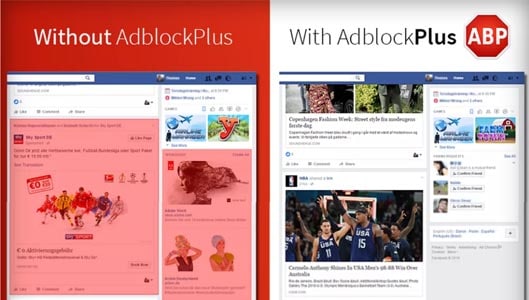Facebook and AdBlock go to war… but who’s right and who will win?
The creators of AdBlock Plus (ABP) and Facebook are not friends. In fact AdBlock Plus are not friends with most websites that rely heavily on advertising to fund their free services.
And that’s because AdBlock Plus’s mission – it’s very reason for existing – is to block adverts on websites, providing what they call “a more friendly and safer user experience.”
The downside to that, of course, is that many websites – ranging from large social networking websites like Facebook to smaller privately owned blogs – will find it more difficult to make money from the services they offer. For smaller websites especially, this may lead to them offering a subscription based service to their viewership, or worse, shutting up shop.
It’s fair to say that Facebook have felt the pinch of loss of revenue as a result of users who use ad blocking software, and this week announced that they have tweaked their website so that software like ABP will be overridden, and those who use the software will still see the same adverts as everyone else. In return Facebook offered additional control over what adverts users will see, allowing users to block certain categories of adverts or even block certain advertisers.
However the community developers of ABP soon found a workaround that will override Facebook’s override, allowing ABP to once more work again on the Internet’s largest social networking website. And it probably won’t be long before Facebook find an override to ABP’s override to Facebook’s original override.
Basically, it’s software war.
Sponsored Content. Continued below...
But who’s right and who will ultimately win?
AdBlock Plus Perspective
AdBlock Plus assert that their mission is to provide a better user friendly experience for the people who use their software, and that experience is one without adverts. The claim is that adverts are intrusive, and get in the way, with sites like Facebook giving too much screen-space to advertisements instead of focussing on their core purpose, social networking.
There are privacy and security issues at stake too. Facebook are world-renowned for tracking their users and harvesting their personal information, in order to provide laser targeted (relevant) adverts towards their users, but according to those who use ad-blocking software, it comes at the expense of privacy.
And from a security perspective, adverts can potentially present another way for criminals to develop traps to ensnare users. In the past, adverts have led to malware-laden websites or even exploited vulnerabilities leading to phishing attacks or malware installations.
Facebook’s Perspective
Facebook is free, meaning in order to fund their mammoth service, it needs to be funded. And that funding relies heavily on advertisements. Facebook’s argument is that if more and more users continue to employ ad-blocking software unhindered, the site will eventually no longer be able to fund such a large venture, and – worst case scenario – we’ll all be left without a Facebook account.
This argument is reflected in other websites and services feeling the pinch of ad-blocking software. While an Internet without ads may sound like the perfect Internet, it means that the majority of free content and online services out there will either no longer be free, or will cease to exist.
Additionally, the unspoken argument from the Facebook camp is that Facebook is – of course – completely optional. To use the site, you need to play by Facebook’s rules, and while Facebook say they are making those rules as fair as possible, an important one is that adverts are non-negotiable. Don’t like it? Facebook won’t say it, but the options are deal with it or leave.
Who will win?
At this time, it’s nigh impossible to tell, but this battle is part of a much larger one between ad-blocking companies (and their users) and websites like Facebook that rely on adverts to fund the services and content that they provide for free. It’s Facebook’s home turf, meaning it’s likely they’ll be able to go several rounds with ABP when it comes to making the latest blocking updates irrelevant, but how much resources will they devote to a browser extension? Facebook are still largely profitable, so that will very much depend on how popular ad-blocking software becomes in the future, and how much of that profit it puts at risk.
In the meantime the losers will certainly be other websites that need adverts on their websites to fund their content. As the popularity of ad-blocking software continues to rise, websites and blogs are finding it more and more difficult to become profitable and new blogs are finding it harder to get off the ground. Software like ABP want a better Internet and are changing the advertising landscape drastically, and on a positive note they are making websites like Facebook evaluate their advertising policies from a more user-friendly perspective, but whether this story has a happy ending for the Internet in general remains to be seen.
Keep up-to-date with all our latest articles. Follow us on Facebook, Instagram and Twitter.
Continued below...
Thanks for reading! But before you go… as part of our latest series of articles on how to earn a little extra cash using the Internet (without getting scammed) we have been looking into how you can earn gift vouchers (like Amazon vouchers) using reward-per-action websites such as SwagBucks. If you are interested we even have our own sign-up code to get you started. Want to learn more? We discuss it here. (Or you can just sign-up here and use code Nonsense70SB when registering.)
Become a Facebook Supporter. For 0.99p (~$1.30) a month you can become a Facebook fan, meaning you get an optional Supporter Badge when you comment on our Facebook posts, as well as discounts on our merchandise. You can subscribe here (cancel anytime.)
